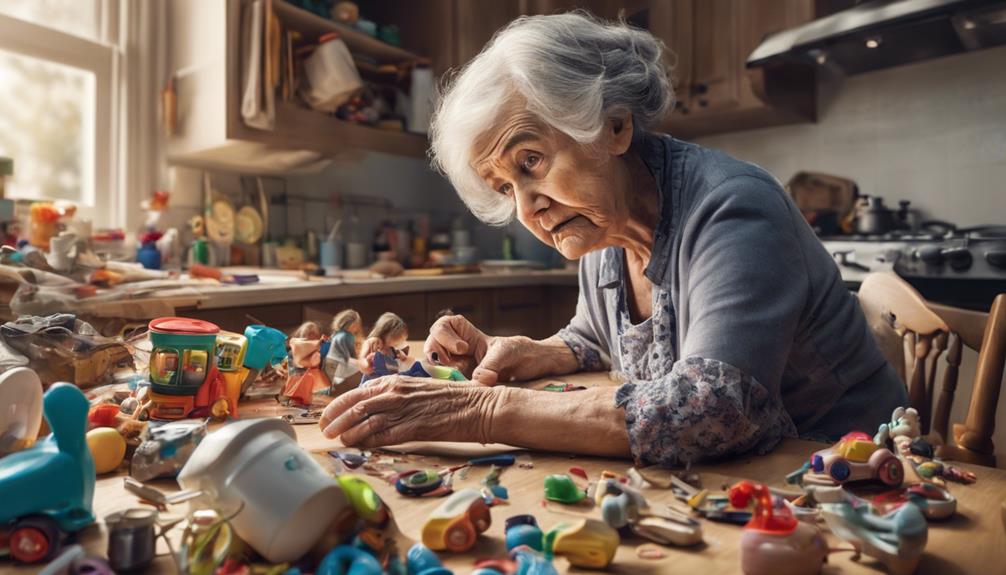To address the burden faced by caregivers such as grandmothers and ensure that negative behaviors do not impact children, it is essential to make self-care a priority. Participate in activities that bring you joy like hobbies and relaxation techniques to help alleviate stress. Finding a balance between caring for yourself and your loved ones will help prevent negative behaviors. Moreover, involving grandchildren in household chores can help them learn responsibility and alleviate some of the workload. Don’t hesitate to reach out to friends, family, or support groups for companionship and assistance to avoid feeling isolated. Consider joining caregiver support groups for practical advice and emotional support. Remember, creating a nurturing environment for children begins with taking care of your own well-being first. Give it a shot and notice the positive changes in your family dynamics.
Key Takeaways
- Prioritize self-care activities to reduce stress and improve well-being.
- Seek support from family, friends, or support groups to lessen isolation.
- Engage grandchildren in household tasks to promote responsibility and bond.
- Join caregiver support groups for emotional support and practical advice.
- Express emotions and provide consistent attention to foster a secure and loving environment.
Importance of Self-Care for Grandmothers
Engaging in self-care activities is vital for grandmothers to effectively manage caregiver burden and prioritize their well-being. Taking time for self-care allows grandmothers to reduce stress, improve mental and physical health, and ultimately provide better care for their grandchildren.
Activities such as engaging in hobbies, practicing relaxation techniques, and seeking support through therapy or support groups can offer emotional support and coping strategies. By balancing self-care with caregiving responsibilities, grandmothers can prevent negative behaviors that may affect the children they're raising.
It's essential for grandmothers to prioritize their own well-being in order to continue serving their families with love and strength. Remember, taking care of oneself isn't selfish but necessary for maintaining a healthy and sustainable caregiving role.
Seek out opportunities for self-care and support to guarantee a fulfilling and balanced life as a grandmother.
Strategies to Reduce Caregiver Stress

To diminish caregiver stress, it's vital to engage in stress management techniques like deep breathing, mindfulness, and meditation.
Seeking support from family, friends, or support groups can help reduce feelings of isolation and provide emotional relief.
Prioritizing self-care activities such as exercise, sleep, and healthy eating is key to maintain physical and mental well-being.
Stress Management Techniques
Implementing stress management techniques such as deep breathing exercises and mindfulness can greatly reduce caregiver stress for grandmothers.
Engaging in physical activities like walking or yoga can also help alleviate stress and enhance overall well-being.
Seeking social support from friends, family, or support groups provides opportunities to share caregiving experiences and feelings.
Additionally, practicing self-care activities such as taking breaks, getting enough rest, and pursuing personal interests is essential in preventing burnout.
When emotional challenges become overwhelming, considering professional help through therapy or counseling can assist grandmothers in coping with the demands of caregiving and managing negative behaviors that may arise.
Self-Care Practices
When it comes to managing caregiver burden for grandmothers, exploring self-care practices is key to reducing stress and maintaining well-being. Here are some effective strategies to help grandmothers alleviate caregiver stress and prioritize their own well-being:
- Engage in regular physical activity, like walking or yoga, to reduce stress and boost overall well-being.
- Practice mindfulness techniques such as meditation or deep breathing exercises to cope with caregiver burden more effectively.
- Seek social support from friends, support groups, or counselors to find emotional outlets and practical advice.
Involving Grandchildren in Household Tasks
When it comes to managing household tasks, involving grandchildren can be beneficial for everyone. It fosters a sense of responsibility and achievement in the younger ones while also teaching them valuable life skills.
Additionally, working together on chores like cooking, cleaning, or gardening can strengthen the bond between grandparents and grandchildren.
Sharing Household Responsibilities
Engaging grandchildren in household tasks not only fosters a sense of responsibility but also strengthens intergenerational bonds and promotes valuable life skills. Sharing household responsibilities is a wonderful way to cultivate a cooperative family environment. Here are some benefits of involving children in chores:
- Promoting Independence: By participating in tasks, children learn to be self-reliant and capable.
- Boosting Self-Esteem: Completing chores successfully can enhance children's confidence and belief in their abilities.
- Alleviating Caregiving Burden: Sharing responsibilities with grandchildren can help grandmothers manage their caregiving duties more effectively, creating a harmonious family dynamic.
Encouraging your grandchildren to contribute to household tasks not only benefits them but also strengthens family bonds and fosters a sense of unity.
Teaching Life Skills
To equip grandchildren with essential life skills, involving them in household tasks not only promotes independence and self-esteem but also strengthens familial bonds and fosters a sense of unity. Assigning age-appropriate chores teaches responsibility, instills self-discipline, and hones time management abilities.
As grandchildren participate in tasks like setting the table, folding laundry, or watering plants, they learn the value of contributing to the household. This shared responsibility creates a bond between generations, fostering teamwork and collaboration. Working together towards a common goal, whether it's cleaning up after a meal or organizing a shared space, can enhance the sense of belonging and cooperation within the family unit.
These experiences help grandchildren develop important life skills that will serve them well in the future.
Seeking Support From Others

Seeking support from others is essential for grandmothers in managing caregiver burden as it provides emotional assistance and practical advice to alleviate stress. When grandmothers feel overwhelmed by the responsibilities of caregiving, reaching out for help can make a significant difference. Here are some ways in which seeking support from others can benefit grandmothers:
- Emotional Assistance: Talking to friends, family members, or counselors can offer a listening ear and understanding, helping grandmothers navigate their feelings of stress and exhaustion.
- Practical Advice: Support groups and social networks can provide valuable insights and coping strategies for dealing with the challenges of caregiving, offering new perspectives and solutions to common problems.
- Shared Experiences: Connecting with other grandmothers who are also raising grandchildren can create a sense of community and solidarity. Sharing experiences and tips with peers facing similar situations can reduce feelings of isolation and empower grandmothers in their caregiving role.
Joining Caregiver Support Groups

Joining caregiver support groups can provide grandmothers with valuable emotional support, understanding, and practical advice in managing caregiver burden. These groups create a sense of community where grandmothers can share experiences, coping mechanisms, and strategies with others facing similar challenges.
By engaging with other caregivers, feelings of isolation can diminish, leaving grandmothers feeling more empowered and capable in their caregiving roles. Support groups not only offer a safe space for sharing but also provide access to important resources, information, and referrals to services that can aid grandmothers in overcoming the obstacles they encounter.
Participating in caregiver support groups can enhance well-being, resilience, and the ability to create a stable and nurturing environment for grandchildren. By joining these groups, grandmothers can find strength in unity, gain valuable insights, and work towards reducing the negative impacts of caregiver burden on both themselves and the children they care for.
Creating a Nurturing Environment for Children

Engaging with caregiver support groups can equip grandmothers with the tools and insights needed to create a nurturing environment for the children under their care. These groups offer a collaborative space for sharing experiences, learning practical strategies, and addressing common challenges. By empowering family caregivers, grandmothers can build confidence in their roles, ensuring the emotional and physical well-being of the children they are raising. Additionally, these support networks often provide access to valuable resources and community connections that further strengthen the caregiving experience. Moreover, participating in these groups can foster a sense of belonging and reduce feelings of isolation that many caregivers face. As grandmothers share their stories, they also find solace in knowing that they are not alone in navigating caregiving emotions. This collective journey not only bolsters their mental health but also enhances their ability to provide love and stability to their grandchildren.
When grandmothers establish consistent routines and clear rules, they provide a stable and predictable atmosphere that promotes positive behaviors in children.
Encouraging open communication and emotional expression fosters a supportive environment where children feel heard and understood, reducing the impact of caregiver burden on their behavior.
Additionally, offering consistent attention and affection to grandchildren helps create a sense of security and well-being, diminishing the likelihood of behavioral issues.
Frequently Asked Questions
What Can Grandparents Do to Lessen the Stress of Raising Their Grandchildren?
To lessen the stress of raising grandchildren, we can engage in self-care, seek social support, utilize community resources, set boundaries, and communicate with parents. These actions help us manage caregiver burden and create a positive environment for the children.
What Are the Emotional and Physical Effects of Grandparents Becoming Primary Caregivers for Their Grandchildren?
Experiencing high levels of caregiver burden, we face emotional and physical strain. Stress, depression, fatigue, and isolation are common. Prioritizing self-care is essential to maintain well-being, positively impacting both us and the children we care for.
What Is the Most Prominent Mental Health Problem Associated With Grandparents Raising Grandchildren?
Depression is the most prominent mental health challenge for grandparents raising grandchildren. It affects their ability to cope with the caregiver burden. Support and resources are crucial to help manage depression and improve outcomes for both generations.
How Do You Deal With Overly Involved Grandparents?
Dealing with overly involved grandparents involves setting boundaries, having honest conversations, and encouraging self-care. Seek support from family or professionals. Allow them positive involvement while respecting primary caregivers' roles. Balance is key for everyone's well-being.
Conclusion
To wrap up, by taking care of ourselves as grandmothers, we can better care for our grandchildren. Just as a well-tended garden flourishes, so too can our relationships with our grandchildren grow and thrive when we prioritize our own well-being.
Remember, just like a plant needs water and sunlight to flourish, we need self-care and support to provide the best care for our little ones. Let's nurture ourselves so we can continue to nurture our grandchildren with love and strength.









